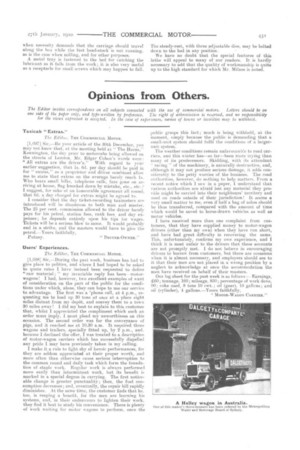Opinions from Others.
Page 17

If you've noticed an error in this article please click here to report it so we can fix it.
The Editor invites correspondence on all subjects connected with the use of commercial motors. Letters should be On one side of the paper only, and type-written by preference. The right of abbreviation is reserved, and no responssbuity for the views expressed is accejted. In the case of experiences, names of towns or localities may be withheld.
Taxicab "Extras."
71/4e Editor. THE COMMERCIAL MOTOR.
[1,097] Sir,—Re your article of the 30th December, you may not know that, at the meeting held at " The Horns," Kennington, the day prior to uaotorcabs being allowed on the streets of London; Mr. Edgar Cohen's words were: "All extras are the driver's." With regard to your earlier suggestion, that is. 6d. per day should be paid in for " extras," as a proprietor and driver combined allow me to state that extras on the average barely reach Is. Who bears small bilks, telephone calls, fare gone on arriving at house, flag knocked down by mistake, etc., etc. I suggest, for sake of an honourable agreement all round, that 6d. a day charged for extras might be agreed to.
I consider that the day ticket-recording taximeters are introduced will be disastrous to both man and nmster. The 23 per cent. commission allowed to the driver barely pays for his petrol, station fees, rank fees, and day expenses; he depends entirely upon his tips for wages. Tickets will be a serious blow to same. It would probably end in a strike, and the masters would have to give the petrol.—Yours faithfully,
Putney. " DE VER-OWNER."
Users' Experiences.
The Editor, THE COMMERCIAL MOTOR.
ppfn Sir,—During the past week, business has had to give plave to politics, and where I had hoped to be asked to quote rates I have instead been requested to define "raw material; " my invariable reply has been—motorwagons! I had, however, two excellent examples of want of consideration on the part of the public for the conditions under which, alone, they can hope to use our service to advantage. The first was a 'phone call, at 4 p.m., requesting me to load up 30 tons at once at a place eight miles distant from my depot, and convey them to a town 30 miles away! I did my best to explain to this customer that, whilst I appreciated the compliment which such an order must imply, I must plead my unworthiness on this occasion. The second order was for the conveyance of pigs, and it reached me at 10.30 a.m. It required three wagons and trailers, specially fitted up, by 2 p.m., and. because I declined the offer, I was treated to a description of motor-wagon carriers which has successfully dispelled any pride I may have previously taken in my calling.
I make it a rule to fight shy of heroic performances, for they are seldom appreciated at their proper worth, and more often than otherwise cause serious interruption to the common round and daily task which form the foundation of staple work. Regular work is always performed more easily than intermittent work, but its benefit is marked in a special degree in carrying. The first noticeable change is greater punctuality ; then, the fuel consumption decreases; and, eventually, the repair bill rapidly diminishes. At the same time, the customer finds that he. too, is reaping a benefit, for the men are learning his systems, and, in their endeavours to lighten their work, they find it best to study his convenience. There is plenty of work waiting for motor wagons to perform, once the public grasps this fact ; much is being withheld, at the moment, simply because the public is demanding that a small-unit system should fulfil the conditions of a largerunit system.
The weather conditions remainunfavourable to road carriers, and this winter has—solar—been more trying than many of its predecessors. Skidding, with its attendant " racing " of the machinery, is naturally destructive, and, although it may not produce serious damage, it adds considerably to the petty worries of the business. The road authorities, however, do nothing to help matters. From a recent notiee which I saw in a paper, I understand that various authorities are afraid lest any material they provide might be carried into their neighbours' territory and used on roads outside of their jurisdiction! It seems a very small matter to me, even if half a bag of ashes should be thus transferred, compared with the amount of time which would be saved to horse-drawn vehicles as well as motor vehicles.
I have received more than one complaint from customers, that they have supplied money to motor-wagon drivers (other than my own) when they have run short, and have had great difficulty in recovering the same. This, unfortunately, confirms my own experience, and I think it is most unfair to the drivers that these accounts are not promptly met. I do not believe in encouraging drivers to borrow from customers, but there are occasions when it is almost necessary, and employers should see to it that their men are not placed in a wrong position by a neglect to acknowledge at once the accommodation the men have received on behalf of their masters.
Our log sheet for the past week is as follows:Earnings, £60; tonnage, 160; mileage, 850; percentage of work done, 90: coke used, S tons 10 cwt.; oil (gear), 10 gallcns; and oil (cylinder), 4 gallons.—Yours faithfully,
" MOTOR-WAGON CARRIER."




















